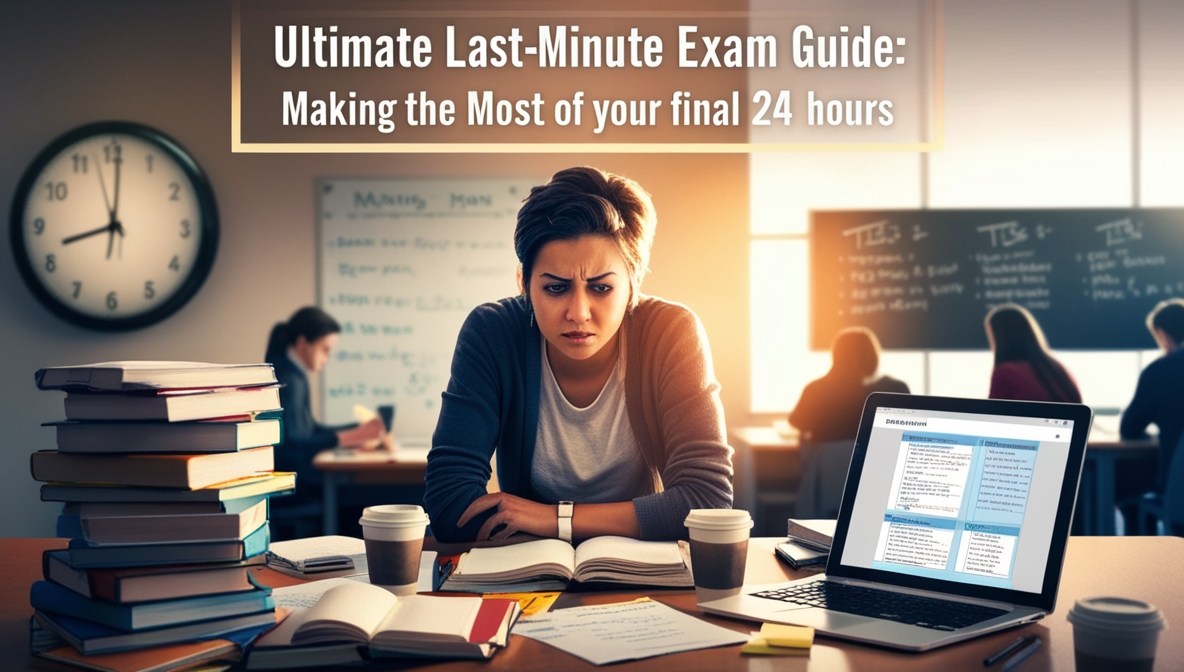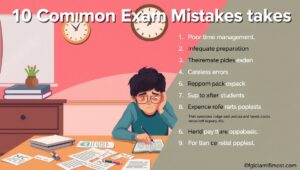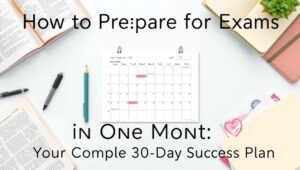The clock is ticking. Your exam is tomorrow, and that familiar mix of adrenaline and anxiety is setting in. Whether you’ve been preparing for weeks or just realized the exam is sooner than you thought, these final 24 hours are crucial. While cramming isn’t ideal, strategic last-minute preparation can significantly impact your performance. This comprehensive guide will walk you through exactly how to optimize your final day before an exam, from morning to night, covering everything from study strategies to stress management.

Understanding the Psychology of Last-Minute Preparation
Before diving into specific strategies, it’s important to understand what’s happening in your brain during this critical period. The day before an exam, your mind is in a unique state—heightened alertness mixed with stress can actually enhance certain types of learning, particularly consolidation of information you’ve already studied. However, this same stress can impair your ability to absorb entirely new, complex concepts. This is why your approach during these final hours needs to be strategic rather than desperate.
The key is to work with your brain’s natural processes rather than against them. Research in cognitive psychology shows that our brains are remarkably good at strengthening existing neural pathways under mild stress, which means reviewing and reinforcing what you already know can be highly effective. Additionally, your brain continues processing information during sleep, making your activities the night before particularly important for memory consolidation.
Morning Strategy: Setting the Foundation
Start your day early, but not drastically earlier than usual. Disrupting your circadian rhythm can impair cognitive function. Aim to wake up at your normal time or perhaps 30 minutes earlier. Begin with a nutritious breakfast that includes complex carbohydrates, protein, and healthy fats. Think oatmeal with nuts and fruit, or eggs with whole grain toast. These foods provide sustained energy and support brain function throughout your study day.
After breakfast, spend 15-20 minutes creating your day’s roadmap. This isn’t time wasted—it’s an investment in efficiency. List all topics you need to review, ranking them by importance and your current confidence level. Focus on high-impact areas where you can realistically improve. If you’re weak in a topic that comprises 40% of the exam, that deserves more attention than perfecting a topic you already understand that only accounts for 10%.
Your morning brain is typically at its sharpest, so use this time for active review of challenging concepts. This means working through practice problems, creating concept maps, or explaining difficult topics aloud as if teaching someone else. The Feynman Technique—explaining complex ideas in simple terms—is particularly effective here. If you can’t explain something simply, you don’t understand it well enough, and this reveals exactly where to focus your efforts.
Midday Momentum: Strategic Review Techniques
As you move into the afternoon, shift your focus from learning new material to consolidating what you know. This is the time for active recall—one of the most powerful study techniques available. Instead of passively rereading notes, test yourself continuously. Close your books and write down everything you remember about a topic. Then check your notes to see what you missed. This process strengthens memory retrieval pathways, making it easier to access information during the exam.
Create or review summary sheets for each major topic. These should be concise—one page per major concept—containing key formulas, definitions, dates, or processes. The act of creating these sheets is valuable in itself, as it forces you to identify and organize the most important information. If you’ve already made summary sheets, now is the time to review and refine them, adding memory aids like acronyms or visual associations.
Practice with past exam papers if available, but approach them strategically. Don’t just solve problems—analyze the question patterns. What types of questions appear frequently? How are they worded? What specific knowledge or skills do they test? Understanding the exam format and question style is almost as important as knowing the content. Time yourself while practicing to build familiarity with the pace you’ll need to maintain.
Between study sessions, take purposeful breaks. The Pomodoro Technique—25 minutes of focused study followed by a 5-minute break—can help maintain concentration. During breaks, avoid social media or activities that might lead you down a rabbit hole. Instead, stretch, take a short walk, or do breathing exercises. These activities refresh your mind without providing competing information that could interfere with what you’re trying to remember.
Evening Preparation: Fine-Tuning and Logistics
As evening approaches, your study strategy should shift again. This is not the time for tackling new or difficult concepts. Instead, focus on reviewing your summary sheets and reinforcing information you’ve already processed. Go through your notes one more time, but quickly, looking for key points you’ve highlighted or starred. This final review helps transfer information from working memory to long-term storage.

Prepare everything you’ll need for tomorrow to eliminate morning stress. Pack your bag with all required materials: pens (bring extras), pencils, calculator (with fresh batteries), student ID, exam admission ticket, watch, water bottle, and permitted snacks. Check the exam location and plan your route, considering potential traffic or transportation delays. Set multiple alarms and have a backup plan for getting to the exam venue.
Review the exam instructions if available. Understand the structure, point distribution, and any specific rules. Know whether you can bring certain materials, if there are choices between questions, and how much time you’ll have for each section. This practical knowledge reduces anxiety and prevents costly mistakes during the exam.
Managing Stress and Anxiety
Stress management is crucial during these final 24 hours. Some anxiety is normal and can actually enhance performance, but excessive stress impairs memory recall and clear thinking. Practice progressive muscle relaxation: tense and release different muscle groups, starting from your toes and working up to your head. This physical relaxation triggers mental calmness.
Avoid catastrophic thinking. Instead of imagining failure, visualize yourself calmly working through the exam, retrieving information successfully, and managing your time well. This positive visualization isn’t just feel-good psychology—it actually prepares neural pathways for successful performance.
Stay connected with supportive people, but avoid those who increase your anxiety. A quick call with someone who believes in you can boost confidence, while comparing preparation levels with anxious classmates often increases stress without providing any benefit. If you’re part of a study group, limit group study sessions the day before to quick clarification of specific points rather than lengthy discussions that might confuse you or reveal gaps that it’s too late to address comprehensively.
The Crucial Final Hours
The night before your exam, stop intensive studying by 9 PM at the latest. Your brain needs time to process and consolidate information. Light review of summary sheets is acceptable, but avoid trying to learn anything new. This is the time for confidence-building review, not panic-driven cramming.
Prepare for sleep strategically. Avoid caffeine after 2 PM and heavy meals close to bedtime. Create a wind-down routine: dim the lights, put away electronic devices at least 30 minutes before bed, and perhaps do some light reading (not study materials) or listen to calming music. Your bedroom should be cool, dark, and quiet. If you’re struggling with racing thoughts, try the 4-7-8 breathing technique: inhale for 4 counts, hold for 7, exhale for 8. This activates your parasympathetic nervous system, promoting relaxation.
Aim for at least 7-8 hours of sleep. Sleep deprivation impairs cognitive function far more than missing a few hours of study. During sleep, your brain consolidates memories, transferring information from temporary storage to long-term memory. This process is particularly important for procedural knowledge—knowing how to solve problems or apply concepts—which is often crucial for exam success.
Common Pitfalls to Avoid
Several common mistakes can sabotage your last-minute preparation. Avoid the temptation to pull an all-nighter. While it might seem like more study time equals better preparation, sleep deprivation severely impairs memory recall, attention, and problem-solving abilities. You’ll perform better with less studied but a well-rested brain than with more material crammed into an exhausted mind.
Don’t drastically change your routine. If you don’t normally drink coffee, the day before an exam isn’t the time to start. Maintain your usual eating patterns and avoid experimenting with “brain-boosting” supplements or energy drinks that might cause jitters or crashes.
Resist the urge to study right until the last second. Frantic last-minute reading outside the exam room rarely helps and often increases anxiety. Instead, arrive early, find a quiet spot to sit, and do some deep breathing or light stretching. Review your one-page summary sheets if you must, but avoid detailed materials that might confuse you at this late stage.
Conclusion: Perspective and Confidence
As you prepare for tomorrow’s exam, remember that while these 24 hours are important, they’re not everything. Your performance will reflect not just this final day but all the learning you’ve done throughout the course. Trust in the knowledge you’ve accumulated and the preparation you’ve completed.

Approach the exam as an opportunity to demonstrate what you know rather than a test of what you don’t. This mindset shift can reduce anxiety and improve performance. Remember that perfection isn’t the goal—doing your best with the preparation you have is.
Finally, maintain perspective. One exam, however important it seems now, is rarely as decisive as we imagine. Your worth isn’t determined by a test score, and there are always opportunities to recover from a disappointing performance. This balanced perspective paradoxically often leads to better performance by reducing paralyzing anxiety.
Tomorrow, you’ll walk into that exam room prepared not just with knowledge but with a clear strategy, a rested mind, and the confidence that comes from knowing you’ve used your final 24 hours wisely. Trust your preparation, stay calm, and show what you know. You’ve got this.



